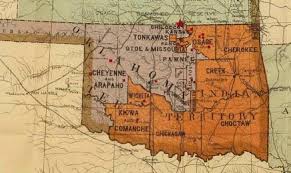
While Oklahoma Gov. Kevin Stitt wants to hold negotiations with leaders of the five Civilized Tribes to discuss how to move ahead from the McGirt Supreme Court ruling, a State Supreme Court case is slowly proceeding on the question—who has regulatory authority over the tribal lands? The State? Or the Tribes?
So far, the State Supreme Court has yet to set a date on which the Justices will hear a challenge to an Oklahoma Corporation Commission ruling that applied to wells in Hughes County. The county falls under the Muscogee (Creek) reservation.
The State Supreme Court took the case filed by Canaan Resources X in December of 2020. But as of this past week, the case (CO-119245) had not been given a hearing date.

However, the Corporation Commission responded Dec. 23, 2020 with a defense of its decision that applied to the five wells in question.
“The Commission found, based on McGirt’s limited applicability, jurisdiction was proper over non-tribal entities conducting oil and gas operations on fee land,” stated attorneys Michele Anderson and Andrew R. Chilson for the Commission.
They pointed to a previous U.S. Supreme Court decision that tribal jurisdiction over non-tribal members on non-tribal land was limited and “did not diminish Commission jurisdiction.”
The decision was Montana v. United States, 450 U.S. 544 made in 1981.
In their concluding defense, the attorneys stated, “The Commission also held jurisdiction was proper under Oklahoma statute and U.S. authority over Five Civilized Tribes land.”

The case in question focuses on an April, 2020 filing by Calyx Energy of Tulsa which sought approval of multiunit horizontal wells, location exceptions, increased density, pooling and exceptions to spacing on property in Hughes County.
Canaan Resources X based in Oklahoma City filed a protest and claimed in July of 2020 that the Commission lacked jurisdiction because of the McGirt ruling by the U.S. Supreme Court. A Commission Administrative Law Judge later denied Canaan’s motion which led to the company’s appeal to the state Supreme Court.
Canaan, formed in 1987, is a private equity firm specializing in acquisition of natural gas properties and wells. In its argument before the ALJ, the company claimed while the McGirt ruling focused on one Seminole Nation Indian who committed a crime on Indian land, it also should include all civil jurisdiction, including oil and gas regulation and not just to the original boundaries of the Creek reservation by to all the reservations of the Five Tribes.
The ALJ ruled otherwise, a ruling that led to the case awaiting a date before the State Supreme Court.





